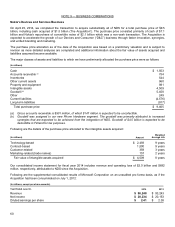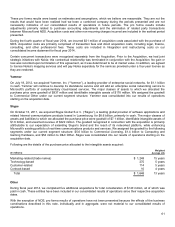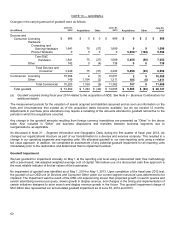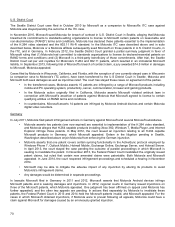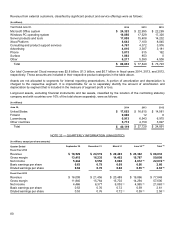Microsoft 2014 Annual Report Download - page 71
Download and view the complete annual report
Please find page 71 of the 2014 Microsoft annual report below. You can navigate through the pages in the report by either clicking on the pages listed below, or by using the keyword search tool below to find specific information within the annual report.
70
U.S. District Court
The Seattle District Court case filed in October 2010 by Microsoft as a companion to Microsoft’s ITC case against
Motorola was stayed pending the outcome of the ITC case.
In November 2010, Microsoft sued Motorola for breach of contract in U.S. District Court in Seattle, alleging that Motorola
breached its commitments to standards-setting organizations to license to Microsoft certain patents on reasonable and
non-discriminatory (“RAND”) terms and conditions. Motorola has declared these patents essential to the implementation
of the H.264 video standard and the 802.11 Wi-Fi standard. In the Motorola ITC case described above and in suits
described below, Motorola or a Motorola affiliate subsequently sued Microsoft on those patents in U.S. District Courts, in
the ITC, and in Germany. In February 2012, the Seattle District Court granted a partial summary judgment in favor of
Microsoft ruling that (1) Motorola had committed to standards organizations to license its declared-essential patents on
RAND terms and conditions; and (2) Microsoft is a third-party beneficiary of those commitments. After trial, the Seattle
District Court set per unit royalties for Motorola’s H.264 and 802.11 patents, which resulted in an immaterial Microsoft
liability. In September 2013, following trial of Microsoft’s breach of contract claim, a jury awarded $14.5 million in damages
to Microsoft. Motorola appealed.
Cases filed by Motorola in Wisconsin, California, and Florida, with the exception of one currently stayed case in Wisconsin
(a companion case to Motorola’s ITC action), have been transferred to the U.S District Court in Seattle. Motorola and
Microsoft both seek damages as well as injunctive relief. The court has stayed these cases on agreement of the parties.
• In the transferred cases, Motorola asserts 15 patents are infringed by a range of Microsoft products including
mobile and PC operating system, productivity, server, communication, browser and gaming products.
• In the Motorola action originally filed in California, Motorola asserts Microsoft violated antitrust laws in
connection with Microsoft’s assertion of patents against Motorola that Microsoft agreed to license to certain
qualifying entities on RAND terms and conditions.
• In counterclaims, Microsoft asserts 14 patents are infringed by Motorola Android devices and certain Motorola
digital video recorders.
Germany
In July 2011, Motorola filed patent infringement actions in Germany against Microsoft and several Microsoft subsidiaries.
• Motorola asserts two patents (one now expired) are essential to implementation of the H.264 video standard,
and Motorola alleges that H.264 capable products including Xbox 360, Windows 7, Media Player, and Internet
Explorer infringe those patents. In May 2012, the court issued an injunction relating to all H.264 capable
Microsoft products in Germany, which Microsoft appealed. Orders in the litigation pending in Seattle,
Washington described above enjoin Motorola from enforcing the German injunction.
• Motorola asserts that one patent covers certain syncing functionality in the ActiveSync protocol employed by
Windows Phone 7, Outlook Mobile, Hotmail Mobile, Exchange Online, Exchange Server, and Hotmail Server.
In April 2013, the court stayed the case pending the outcome of parallel proceedings in which Microsoft is
seeking to invalidate the patent. In November 2013, the Federal Patent Court invalidated the originally issued
patent claims, but ruled that certain new amended claims were patentable. Both Motorola and Microsoft
appealed. In June 2014, the court reopened infringement proceedings and scheduled a hearing in November
2014.
• Microsoft may be able to mitigate the adverse impact of any injunction by altering its products to avoid
Motorola’s infringement claims.
• Any damages would be determined in separate proceedings.
In lawsuits Microsoft filed in Germany in 2011 and 2012, Microsoft asserts that Motorola Android devices infringe
Microsoft patents and is seeking damages and injunctions. In 2012, regional courts in Germany issued injunctions on
three of the Microsoft patents, which Motorola appealed. One judgment has been affirmed on appeal (and Motorola has
further appealed), and the other two appeals are pending. In actions filed separately by Motorola to invalidate these
patents, the Federal Patent Court in 2013 and 2014 held the Microsoft patents invalid, and Microsoft appealed. For the
cases in which Microsoft obtained injunctions, if Motorola were to prevail following all appeals, Motorola could have a
claim against Microsoft for damages caused by an erroneously granted injunction.


